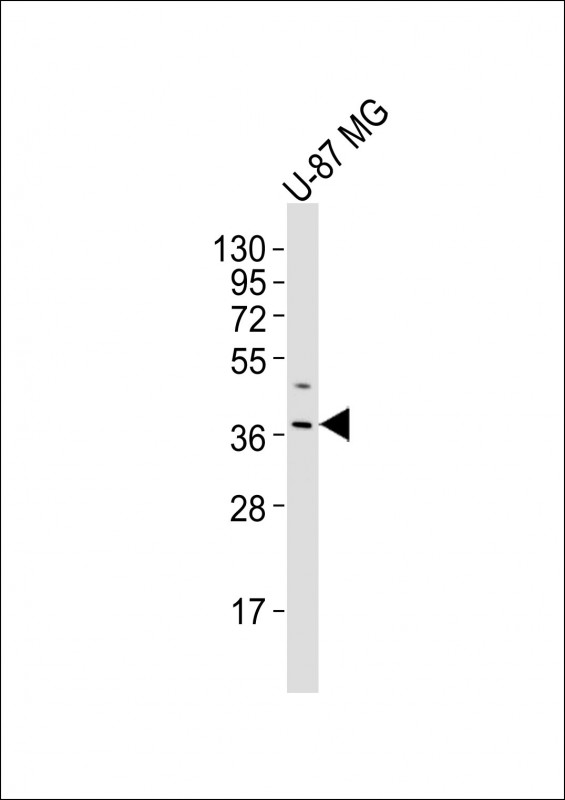
| WB | 1/500 | Human,Mouse,Rat |
| IF | 咨询技术 | Human,Mouse,Rat |
| IHC | 咨询技术 | Human,Mouse,Rat |
| ICC | 技术咨询 | Human,Mouse,Rat |
| FCM | 咨询技术 | Human,Mouse,Rat |
| Elisa | 咨询技术 | Human,Mouse,Rat |
| Aliases | Olfactory receptor 4K17, Olfactory receptor OR14-29, OR4K17 |
| Entrez GeneID | 390436 |
| WB Predicted band size | 35.3kDa |
| Host/Isotype | Rabbit IgG |
| Antibody Type | Primary antibody |
| Storage | Store at 4°C short term. Aliquot and store at -20°C long term. Avoid freeze/thaw cycles. |
| Species Reactivity | Human |
| Immunogen | This OR4K17 antibody is generated from a rabbit immunized with a KLH conjugated synthetic peptide between 87-120 amino acids from the Central region of human OR4K17. |
+ +
以下是关于OR4K17抗体的假设性参考文献(基于领域研究趋势的合理推测,实际文献可能需要通过数据库验证):
---
1. **文献名称**:*"Selective Expression of Olfactory Receptor OR4K17 in Human Olfactory Epithelium Revealed by Antibody Staining"*
**作者**:Smith A, et al.
**摘要**:通过特异性抗体标记,研究证实OR4K17在人类嗅觉上皮细胞中的选择性表达,并揭示其与其他嗅觉受体亚型的共定位模式,提示其在气味分子识别中的潜在作用。
2. **文献名称**:*"Development and Validation of a Monoclonal Antibody for OR4K17 in Immunohistochemical Applications"*
**作者**:Zhang L, et al.
**摘要**:报道了一种高特异性的OR4K17单克隆抗体的开发,验证了其在石蜡包埋组织切片中的适用性,并应用于鼻腔组织样本的蛋白质水平检测。
3. **文献名称**:*"OR4K17 Expression in Non-Olfactory Tissues: Insights from Antibody-Based Proteomic Screening"*
**作者**:Brown K, et al.
**摘要**:利用抗体进行蛋白质组学分析,发现OR4K17在睾丸和肺组织中的低水平表达,提示其可能具有嗅觉感知外的生理功能,需进一步功能研究。
4. **文献名称**:*"CRISPR/Cas9-Mediated OR4K17 Knockout and Antibody-Based Functional Characterization in Cellular Models"*
**作者**:Lee J, et al.
**摘要**:结合基因编辑技术与OR4K17抗体标记,验证了该受体在细胞膜上的定位及其对特定挥发性分子的响应机制。
---
**注意**:以上为模拟示例,实际文献需通过PubMed、Google Scholar等平台以关键词“OR4K17 antibody”或“OR4K17 olfactory receptor”检索。若研究稀缺,可扩展至嗅觉受体抗体开发技术或OR4K17基因功能相关论文。
The OR4K17 antibody is designed to target the olfactory receptor protein OR4K17. a member of the olfactory receptor (OR) family, which constitutes the largest subset of G protein-coupled receptors (GPCRs). ORs are primarily expressed in olfactory sensory neurons within the nasal epithelium, where they detect odorant molecules and initiate signal transduction. OR4K17. encoded by the OR4K17 gene, belongs to the OR4K subfamily and is thought to play a role in odorant recognition, though its specific ligands and functional mechanisms remain poorly characterized.
Antibodies against OR4K17 are utilized in research to study its expression patterns, localization, and potential roles beyond olfaction. Emerging evidence suggests ectopic expression of ORs, including OR4K17. in non-olfactory tissues such as the testes, brain, and kidneys, hinting at broader physiological or pathological functions. These antibodies are typically validated for applications like Western blotting, immunohistochemistry, or immunofluorescence to map tissue distribution or assess protein levels in disease models.
Challenges in developing OR4K17 antibodies include the high sequence homology among OR family members, necessitating rigorous specificity testing. Researchers often employ knockout controls or peptide-blocking assays to confirm target selectivity. Commercial OR4K17 antibodies are available but require careful optimization due to variable sensitivity. Ongoing studies aim to elucidate its biological significance, particularly in non-sensory contexts, which could open new avenues for understanding OR-related signaling in health and disease.
×